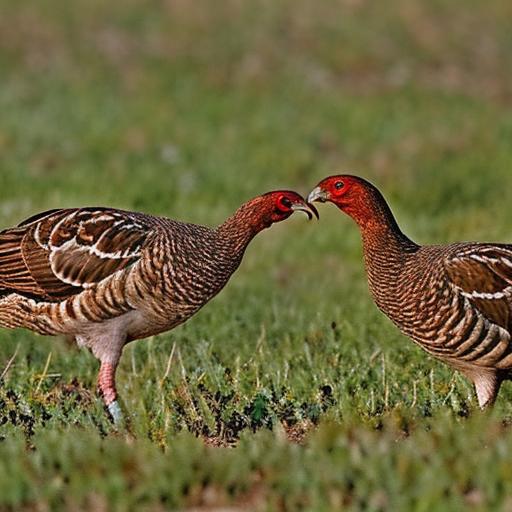Turkey breeding season is a crucial time for turkey farmers and breeders. It is the period when turkeys are encouraged to mate and reproduce, ensuring the continuation of the turkey population. The breeding season typically occurs in the spring, as the longer days and warmer temperatures trigger hormonal changes in turkeys, leading to increased mating behavior. During this time, turkey breeders carefully manage their flocks to optimize breeding success and ensure the production of healthy poults (young turkeys). The breeding season is a critical aspect of turkey farming, as it directly impacts the overall productivity and success of the operation.
The breeding season is a time of heightened activity and attention to detail for turkey farmers. It requires careful planning and management to ensure that the turkeys are in optimal condition for breeding. This includes providing the right nutrition, monitoring the health of the birds, and creating suitable breeding environments. Additionally, turkey breeders must be knowledgeable about the factors that can affect the breeding season, such as lighting, temperature, and genetics. By understanding these factors and implementing effective management practices, turkey farmers can maximize breeding success and ultimately contribute to the sustainability of the turkey industry.
Key Takeaways
- Turkey breeding season typically occurs in the spring and early summer, when the days are longer and the weather is warmer.
- The length of turkey breeding season can vary, but it generally lasts for several months, allowing for multiple breeding cycles.
- Factors such as daylight length, temperature, and nutrition can affect the timing and success of turkey breeding season.
- The breeding season is crucial for the production of turkey poults, which are essential for the turkey industry.
- The breeding season plays a key role in the reproductive success of turkeys, impacting the overall population and industry.
Length of Turkey Breeding Season
The length of the turkey breeding season can vary depending on several factors, including geographic location, breed of turkeys, and management practices. In general, the breeding season for turkeys typically lasts from early spring to early summer, spanning approximately 3-4 months. During this time, turkey breeders carefully monitor their flocks for signs of mating behavior and adjust their management practices to support successful breeding.
The length of the breeding season is influenced by natural environmental cues, such as increasing daylight hours and rising temperatures. These changes trigger hormonal responses in turkeys, stimulating mating behavior and reproductive activity. Additionally, the length of the breeding season can be influenced by artificial lighting and temperature control in commercial turkey production facilities. By manipulating these factors, turkey farmers can extend or shorten the breeding season to align with their production goals and market demands. Overall, the length of the turkey breeding season is a critical consideration for turkey farmers, as it directly impacts the timing and success of turkey reproduction.
Factors Affecting Turkey Breeding Season
Several factors can influence the success and duration of the turkey breeding season. One of the most significant factors is lighting. As mentioned earlier, increasing daylight hours in the spring trigger hormonal changes in turkeys, stimulating mating behavior and reproductive activity. In commercial turkey production facilities, artificial lighting can be used to extend daylight hours and promote breeding activity outside of the natural breeding season. This practice allows turkey farmers to control the timing of reproduction and optimize production schedules.
Temperature is another important factor that can affect the turkey breeding season. Turkeys are sensitive to temperature changes, and extreme heat or cold can negatively impact their reproductive performance. During the breeding season, it is crucial for turkey farmers to provide a comfortable and stable environment for their flocks to support successful mating and egg production. Additionally, genetics play a significant role in determining the reproductive performance of turkeys. Selecting breeds with strong reproductive traits and genetic potential can contribute to improved breeding success and overall flock productivity.
Nutrition is also a critical factor that can influence the turkey breeding season. Providing a balanced diet with essential nutrients is essential for supporting reproductive health and performance in turkeys. Proper nutrition can help ensure that turkeys are in optimal condition for breeding and can contribute to the production of healthy poults. Overall, understanding and managing these factors are essential for maximizing breeding success and ensuring the sustainability of turkey farming operations.
Importance of Turkey Breeding Season
The turkey breeding season is of utmost importance for the sustainability and success of the turkey industry. It is during this time that turkeys mate and reproduce, leading to the production of poults that will grow into mature birds for meat production or future breeding stock. The successful continuation of the turkey population relies on a productive and well-managed breeding season. Additionally, the timing and success of the breeding season directly impact the availability of turkeys for meat production, as well as the overall productivity and profitability of turkey farming operations.
Furthermore, the turkey breeding season plays a crucial role in maintaining genetic diversity within turkey populations. By carefully selecting breeding stock and managing mating practices, turkey farmers can contribute to the preservation of desirable traits and genetic diversity within their flocks. This is essential for maintaining healthy and resilient turkey populations that are better equipped to adapt to environmental changes and disease challenges. Overall, the importance of the turkey breeding season cannot be overstated, as it is fundamental to the sustainability and success of the turkey industry.
Turkey Breeding Season and Reproduction
The turkey breeding season is a critical period for reproduction, as it is during this time that turkeys mate and produce fertilized eggs. Mating behavior in turkeys is influenced by hormonal changes triggered by increasing daylight hours and rising temperatures in the spring. Male turkeys, known as toms, display courtship behavior to attract female turkeys, known as hens, for mating. Once mating occurs, hens will begin laying fertilized eggs, which will be incubated either naturally or artificially to hatch into poults.
Successful reproduction during the breeding season is essential for maintaining and expanding turkey populations. It ensures a consistent supply of turkeys for meat production and provides a foundation for future breeding stock. Additionally, effective reproduction practices during the breeding season contribute to genetic diversity within turkey populations, which is crucial for maintaining healthy and resilient flocks. By carefully managing mating practices and providing optimal conditions for reproduction, turkey farmers can maximize breeding success and contribute to the long-term sustainability of the turkey industry.
Managing Turkey Breeding Season

Managing the turkey breeding season requires careful planning and attention to detail to ensure optimal reproductive performance in turkeys. One key aspect of managing the breeding season is providing a suitable environment for mating and egg production. This includes creating comfortable housing conditions with proper ventilation, temperature control, and nesting areas for hens to lay eggs. Additionally, ensuring that turkeys receive a balanced diet with essential nutrients is crucial for supporting reproductive health and performance during the breeding season.
Furthermore, monitoring the health of the flock is essential for successful breeding. Regular health checks and disease prevention measures can help identify and address any issues that may impact reproductive performance. Additionally, selecting high-quality breeding stock with strong reproductive traits can contribute to improved breeding success during the season. By carefully managing these aspects and implementing effective reproductive practices, turkey farmers can optimize breeding performance and contribute to the overall success of their operations.
Conclusion and Future of Turkey Breeding Season
In conclusion, the turkey breeding season is a critical period for turkey farmers and breeders, as it directly impacts the sustainability and success of the turkey industry. Understanding the factors that influence the length and success of the breeding season is essential for maximizing reproductive performance in turkeys. By carefully managing environmental conditions, nutrition, genetics, and health, turkey farmers can optimize breeding success and contribute to healthy and resilient turkey populations.
Looking ahead, advancements in technology and research will continue to play a significant role in shaping the future of the turkey breeding season. Innovations in genetics, nutrition, and reproductive management practices will offer new opportunities for improving breeding performance and overall flock productivity. Additionally, ongoing efforts to enhance animal welfare standards and sustainability practices will further support the long-term success of the turkey industry. Ultimately, by prioritizing effective management practices and embracing innovation, turkey farmers can continue to ensure productive and successful breeding seasons for years to come.
If you’re interested in learning more about poultry breeding, you might also want to check out this informative article on when guinea fowl lay eggs. Understanding the breeding seasons of different poultry species can be essential for successful farming and raising healthy birds.
FAQs
What is the turkey breeding season?
The turkey breeding season refers to the time of year when turkeys engage in mating and reproduction activities.
How long is the turkey breeding season?
The turkey breeding season typically lasts from late March to early May, with peak mating activity occurring in April.
What factors influence the length of the turkey breeding season?
The length of the turkey breeding season can be influenced by factors such as the availability of food, weather conditions, and the overall health and condition of the turkey population.
Why is the turkey breeding season important?
The turkey breeding season is important for the continuation of the species and the production of new turkey offspring. It is also a crucial time for wildlife management and conservation efforts.
How do turkeys mate during the breeding season?
During the breeding season, male turkeys, known as toms, display their feathers and perform elaborate courtship displays to attract female turkeys, known as hens. Once a hen is receptive, mating occurs.
What happens after the turkey breeding season ends?
After the breeding season ends, hens will begin nesting and laying eggs, while toms may continue to display and compete for mates. The focus shifts to the incubation and hatching of turkey eggs.
Meet Walter, the feathered-friend fanatic of Florida! Nestled in the sunshine state, Walter struts through life with his feathered companions, clucking his way to happiness. With a coop that’s fancier than a five-star hotel, he’s the Don Juan of the chicken world. When he’s not teaching his hens to do the cha-cha, you’ll find him in a heated debate with his prized rooster, Sir Clucks-a-Lot. Walter’s poultry passion is no yolk; he’s the sunny-side-up guy you never knew you needed in your flock of friends!







